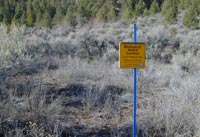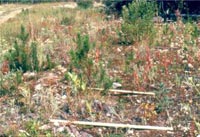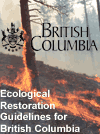 |
|

Measurable
Parameters
Making
restoration goals explicit and measurable is a critical step in
restoration planning. Without a way to measure progress, we cannot
assess the success towards our original goals, or discern whether
such work is worth doing in future. Adaptive
management (Walters 1986) is the term used for the "feedback
loop" of continuous learning and improvement that is created
by formulating clear restoration goals and then monitoring
achievement of these goals (Gayton 2001), especially as the work
progresses. Often we need both short-term and long-term goals in
order to do this.
Appendix
2 describes an overview of Adaptive Management in the context
of ecological restoration.

Tanis Douglas
|

Dave Polster
|
Left: Where the restoration goal is re-establishing
a native plant community damaged by knapweed invasion, a measurable
restoration objective could be a certain percent decrease in knapweed
cover, with a concomitant increase in cover of the desired species.
Right: Measuring changes in plant species composition by assessing
ground cover in square 'plots' along a transect.
|
The parameters used to measure the success of
restoration projects are sometimes self-evident. For example, if
the goal is to restore fish habitat, fish densities or numbers will
be measured; if the objective is to re-forest an area, tree survival
will be measured. In other cases an indicator that provides information
about ecosystem changes will be selected.
|
Measuring Ecosystem Change Using Indicators
|
|
The following are examples of indicators to measure ecosystem
change.
|
|
|
Measuring species composition change in treated ecosystems:
- Wildlife assessments
- Breeding bird surveys
- Amphibian counts
- Vegetation cover - assessing vascular and/or non-vascular plants
Measuring abiotic indicators of ecosystem recovery:
- Soil nutrients
- Soil organic matter
- Hydrologic recovery (water flow and timing)
|
|








